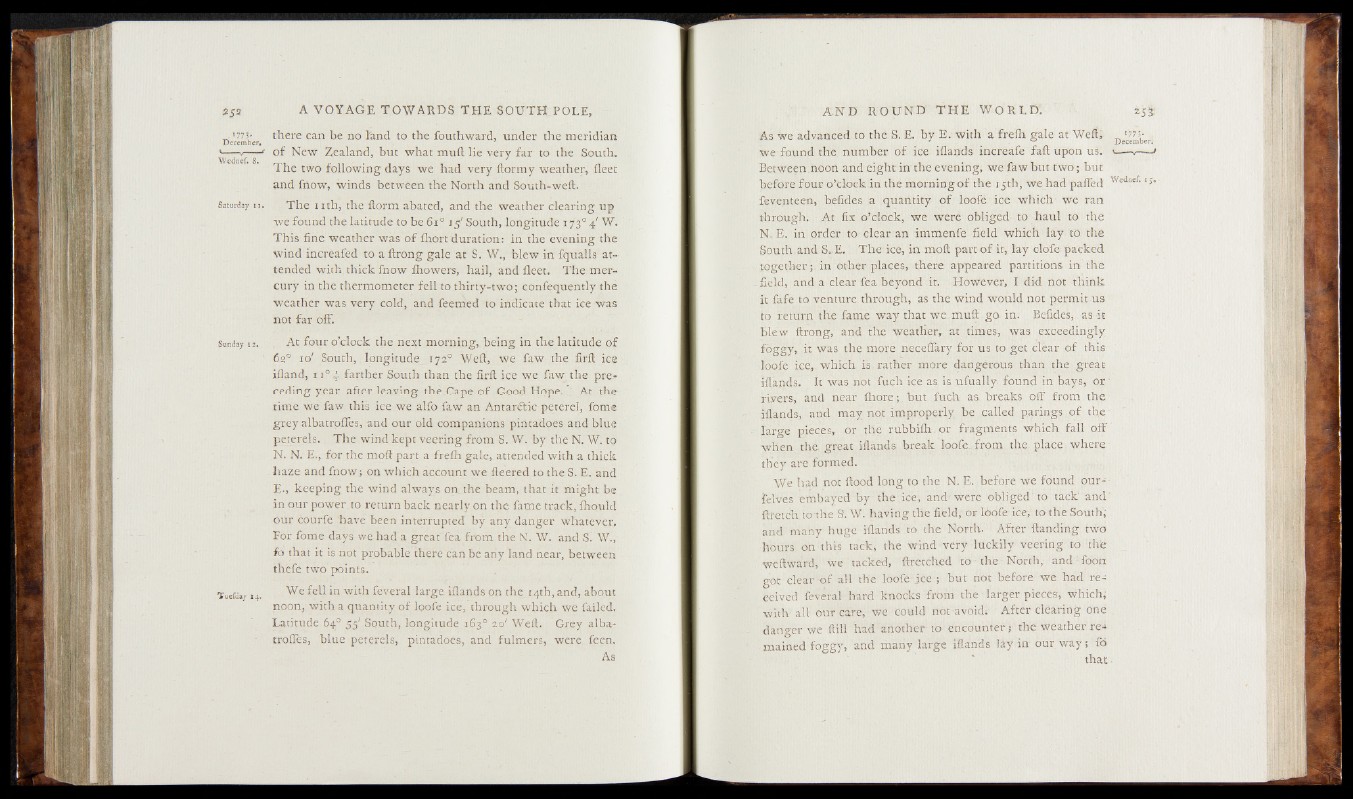
'773- there can be no l'and to the fouthward, under the meridian jDcccrnbd*»
<----•----• of New Zealand, but what mult lie very far to the South.
Wednef. 8. The two following days we had very ftormy weather, fleet
and fnow, winds between the North and South-weft.
Saturday u . The nth, the ftorm abated, and the weather clearing up
we found the latitude to be 6i° 15' South, longitude 173° 4' W.
This fine weather was of fhort duration: in the evening the
wind increafed to a ftrong gale at S. W., blew in fqualls attended
with thick fnow fhowers, hail, and fleet. The mercury
in the thermometer fell to thirty-two" confequently the
weather was very cold, and feemed to indicate that ice was
not far off.
Sunday iz. At four o’clock the next morning, being in the latitude of
63° 10' South, longitude 1720 Weft, we faw the firft ice
ifland, 1 1° 4- farther South than the firft ice we favy the preceding
year after leaving the Cape of Good Hope. At the
time we faw this ice we alfo faw an Antarctic peterel, fome
grey albatrofles, and our old companions pintadoes and blue
peterels. The wind kept veering from S. W. by the N. W. to
N. N. E., for the moft part a frefh gale, attended with a thick
haze and fnow; on which account we fleered to the S. E. and
E., keeping the wind always on the beam, that it might be
in our power to return back nearly on the fame track, fhould
our courfe have been interrupted by any danger whatever.
For fome days we had a great fea from the N. W. and Si W.,
fo that it is not probable there can be any land near, between
thefe two points.
Tuefday 14. jfeH in with feveral large iflands on the 14th, and, about
noon, with a quantity of loofe ice, through which we failed.
Latitude 64° 55' South, longitude 163° 20' Weft. Grey alba-
trofles, blue peterels, pintadoes, and fulmers, were, feen.
As
As we advanced to the S. E. by E. with a frefh gale at Weft,
we found the number of ice iflands increafe fall upon us. <■— „— ->
Between noon and eight in the evening, we faw but two; but
before four o’clock in the morning of the 15th, we had paffed Wed"e' IS‘
feventeen, befides a quantity of loofé ice which we ran
through. At fix o’clock, we were obliged to haul to the
N. E. in order to clear an immenfe field which lay to the
South and S..E. The ice, in moft part of it, lay olofe packed
togetherin other places, there appeared partitions in the
field, and a clear fea beyond it. However, I did not think
it fafe to venture through, as the wind would not permit us
to return the fame way that we muii go in. Befides,. as it
blew ftrong, and the weatlierr at times, was exceedingly
foggy, it was the more neceffary for us to get clèar of this
loofe ice,, which is rather more dangerous than the great
iflands. It was not fuch ice as is ufually. found in bays, or
rivers, and near fhore; . but fuch as. breaks off from the
iflands, and may not improperly be called parings of the-
Iarge pieces, or the rubbifh.or fragments which fall off
when the great iflands break loofe.. from the place where
they are formed.
We had not flood long to the N. E. before we found our-
felves embayed by the ice, and were obliged to tack' and’
ftretch to the S. W. having the field, or loofe ice; to the South,
and many huge iflands to the North. After {landing two
hours on this tack, the wind very luckily veering to the
weftward, we tacked, ftretched to the North, and foon
got clear-of all the loofe ice ; but not before we had received
feveral hard knocks from the larger pieces, which,
with all our care, we could not avoid.- After clearing one .
danger we ftill had another to encounter; the weather re-*
mained foggy, and many large iflands lay in our way; fd
that